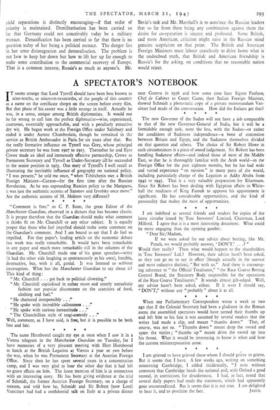A SPECTATOR'S NOTEBOOK
IT seems strange that Lord Tyrrell should have been best known to nine-tenths, or nineteen-twentieths, of the people of this country as a name on the certificate shown on the screen before every film. But that phase of his career was a little strange in itself. Actually he was, in a sense, unique among British diplomatists. It would not be far wrong to call him the perfect diplomatist—wise, experienced, courteous, essentially approachable, and with a peculiarly attractive dry wit. He began work at the Foreign Office under Salisbury and ended it under Austen Chamberlain, though he remained in the service as British Ambassador in Paris for six years after that. But the really formative influence on Tyrrell was Grey, whose principal private secretary he was from 19o7 to 1915. Thereafter he and Eyre Crowe made an ideal and immensely effective partnership, Crowe as Permanent Secretary and Tyrrell as Under-Secretary till he succeeded to the senior position in 1925. One story of Tyrrell's I well recall as illustrating the inevitable influence of geography on national policy. " I was present," he told me once, "when Tchitchenin met a British Foreign Minister—Curzon—for the first time after the Russian Revolution. As he was expounding Russian policy to the Marquess, it was just the authentic accents of Sazonov and Izvolsky once more." Are the authentic accents of M. Molotov very different?


































 Previous page
Previous page